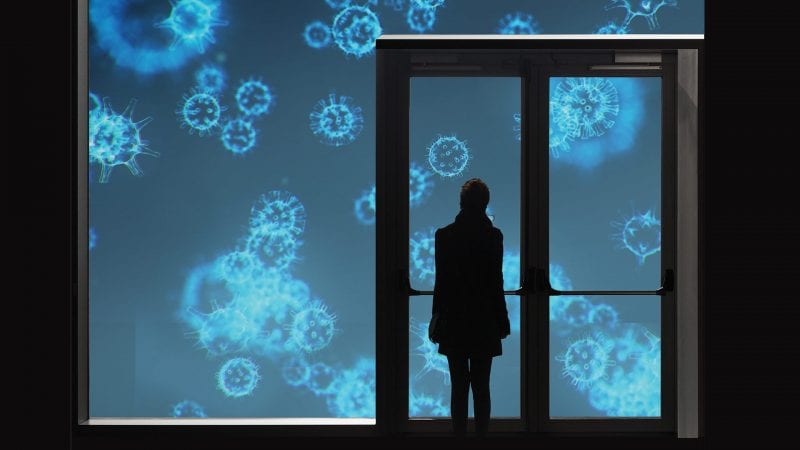Pandemic Sparks Wave of Mental-health Concerns
High Anxiety
By Joseph Bednar
Most people have plenty of experience preparing for things, Alane Burgess says, whether that’s surgery, a vacation, the birth of a child — the list is endless.
The common denominator, most of the time, is planning for that major life event at one’s own pace, or at least having time to think about it.
“We tend to operate on the basis of what we know,” said Burgess, clinic director of BestLife Emotional Health & Wellness Center, a program of MHA Inc. “We have a routine, structure, an expectancy of what will happen. With COVID, we’ve taken a severe turn; it’s turned people’s lives upside down, and we didn’t have any way to plan or prepare for these events. It was very sudden, something we couldn’t have seen coming in a lot of ways.”

“Unfortunately, we’ve seen an increase in mental-health concerns with the impact of COVID. Businesses have closed, people are facing the crisis of being furloughed or laid off, so it’s natural we’d see an increase in anxiety, and with that comes a lot of depression, in terms of fear and loss.”
She’s not talking about the virus itself as much as the changes that followed: job losses and economic fears, isolation born from social distancing, the elimination of most activities away from home, the switch to remote learning for kids, teens, and college students.
And the mental stresses that accompany those changes.
“Unfortunately, we’ve seen an increase in mental-health concerns with the impact of COVID,” Burgess told HCN. “Businesses have closed, people are facing the crisis of being furloughed or laid off, so it’s natural we’d see an increase in anxiety, and with that comes a lot of depression, in terms of fear and loss.”
That idea is backed up by Opinium Research’s recent survey, titled “Coping with COVID-19: The Impact of Coronavirus on Mental and Physical Well-being.”
More than half of U.S. respondents (53%) feel COVID-19 has impacted their mental well-being in some way, while nearly two in five (39%) say they have felt regularly overwhelmed by the news or worried about the future, and 27% report regularly feeling isolated, with an additional 34% saying they’ve felt isolated on occasion.
Though the virus is known to pose a greater health risk to the elderly, the situation seems to be taking a negative toll on the well-being of younger generations by every measure.
“People are adjusting their schedules and doing a lot of dual roles now; some parents are not only working from home, but have to be the teacher at home as well,” Burgess said. “They were working eight hours a day, and now it’s nine or 10 hours, and couple that with having to help the child with schoolwork and also continue to cook and clean and do other household chores as well.”
On top of that are the constant thoughts about whether it’s even safe to be out and about, at the grocery store or other stops along the daily routine, and the anxiety and guilt those thoughts can produce. And for those who work in the healthcare field or other ‘essential’ services, from manufacturing plants to grocery stores, there’s a constant fear about bringing COVID-19 home to their loved ones, she added.
Even grieving the dead has been disrupted, with virtual services replacing traditional funerals.
“If someone is noticing they’re not feeling their best or they’re becoming more isolated or withdrawn, that would be the time to reach out and make a phone call.”
“This all brings up so many questions — things we couldn’t prepare for — and it happened almost overnight,” she went on. “Now the whole world is different: your lifestyle, your routine, your structure, everything you know is different. And such rapid adjustments can certainly push somebody toward anxiety, depression, isolation, and fear.”
MHA, through its BestLife center and in other ways (more on that later), is just one of many organizations throughout Western Mass. paying attention to the mental-health impact of COVID-19 and connecting with individuals and families that need help during a decidedly unique time.
Vulnerable Youth
Square One, the Springfield-based early-education provider, has reported growing concerns about the health and well-being of the region’s most vulnerable families.
“In addition to helping our families meet their basic needs, we know that, during times of isolation, there is an increase in domestic violence, child abuse and neglect, and mental-health crises,” said Joan Kagan, president and CEO of Square One. “It is absolutely critical that our staff maintain a steady presence in the lives of our children and families to help protect them from any harm.”
Under normal circumstances, Square One educators, therapists, social workers, and home visitors are a constant physical presence in the lives of the community’s children and families. They are trained to notice signs of distress and respond appropriately. But the COVID-19 pandemic and call for social distancing has changed the way the Square One team is meeting its responsibilities, with increased emphasis on virtual learning, check-in calls, and deliveries of emergency supplies to more than 80 families throughout the region.
Likewise, the Square One Cornerstone Therapy Center team has performed virtual therapy sessions for the agency’s most vulnerable children who have experienced trauma in the past and now during the pandemic.
“Our constant presence is needed more than ever before to keep our children and families safe. We’re seeing families struggling with parental stress, depression, and anxiety,” said Jenise Katalina, vice president of Family Support Services at Square One. “In particular, our families who are parenting while in addiction recovery are facing tremendous struggles. This is not an easy time for anyone, but for those who were already challenged and vulnerable, the need for support and potential for danger is heightened to a greater degree.”
Another vulnerable group is teenagers, who have not only seen their routines regarding school, friends, and activities — and some of their milestones — disrupted (see opinion on page 6), but are internalizing the financial stress their parents are feeling as well.
In fact, more than two-thirds of teens (69%) say they are either somewhat or very concerned about the impact of the pandemic on their families and day-to-day lives, according to a recent survey by Junior Achievement USA (JA) and Citizens Bank.
The survey of 1,000 U.S. teens, aged between 13 and 18 and not currently attending college, found that nearly three-quarters of teens (72%) say they have had a discussion with their parents or guardian about finances as a result of COVID-19. Nearly one-quarter (24%) say their parents or caregivers have shared with them their concerns about paying bills, while 13% say their parent or caregiver has lost their job due to COVID-19.
“Families across America are dealing with the short and long-term challenges of the coronavirus pandemic, and teenagers are feeling these impacts, while also navigating being home from school and not knowing what the future holds for them,” said Brendan Coughlin, head of Consumer Banking at Citizens Bank.
More than half of the teens surveyed (57%) are concerned about how COVID-19 will impact their plans for the future. The only concern that worries them more is a family member getting sick (60%).
“These survey results show that our kids are not immune to the concerns related to the financial impact of COVID-19,” said Jack Kosakowski, president and CEO of Junior Achievement USA. “We at Junior Achievement are reaching out to parents and caregivers to provide resources to talk to their teens about what’s happening in a way that not only informs but provides reassurance that things will eventually get better.”
College students have felt the pressure as well. Christina Royal, president of Holyoke Community College, told HCN last month that the need for mental-health services has been significant, as students spent the past two months not only finishing their spring semester online, but in many cases dealing with job loss and even food insecurity as well.
“We’ve expanded and diversified our offerings so students feel able to connect with a counselor or therapist,” Royal said. “People are living with a large amount of anxiety. They signed up for a face-to-face class, and now we’re telling them they can’t do that. Also, we know students who have two or three jobs, they’re caretakers for other children and family members, and sometimes several people in a household are trying to negotiate the use of one computer.”
And the pandemic, and accompanying economic shutdown, has only exacerbated those stressors in many cases, she added.
“With all the stress students are dealing with, the mental-health piece has risen up as a topic of concern — in the community at large, but it’s also reflected in the college environment.”
Remote Access
Gándara Center in West Springfield, which specializes in minority mental health, is seeing a boom in the number of people it serves.
Almost half of Americans feel the coronavirus crisis is harming their mental health, according to a poll by the Kaiser Family Foundation. That’s a particular danger during social-distancing mandates, when isolation and anxiety are exacerbating people’s mental-health problems. And COVID-19 presents a double jeopardy to minority communities as the pandemic takes not only a physical toll on them but also a psychological one.
“This crisis is making life much more difficult for those we serve, including those in recovery and people who have yet to be treated for such problems as anxiety and depression,” said Gándara Center Outpatient Services Director Dr. Madeline Aviles-Hernandez. “Minorities have been — and continue to be — less likely to receive mental-health treatment.”
The agency — which specializes in Hispanic services, but also delivers services to African-Americans and other diverse populations — recently added telehealth to its services, and its peer-recovery support centers are using virtual recovery coaches and virtual recovery events and meetings.
“Right now, thanks to Gov. Charlie Baker’s orders expanding access to telehealth, people in our communities have more access to our telehealth phone and video services,” Aviles-Hernandez said. “The people we serve are finding telehealth care extremely helpful as the pandemic causes society’s most vulnerable populations unprecedented levels of stress and anxiety. These virtual services will help to avoid hospitalizations and emergency-room visits at a time when the healthcare system is strained because of COVID-19.”
Nationally, suicide hotlines are getting more calls daily, and experts say the trauma of the pandemic could cause a spike in substance use — something that happened in Louisiana after Hurricane Katrina.
“The coronavirus crisis is highlighting the fact that communities of color have less access to mental healthcare and substance-use-disorder treatment, and we’re still working hard to change that,” Aviles-Hernandez said. “Our telehealth services are certainly helping.”
That’s also the case at MHA, whose TeleWell service allows clinicians and their clients make virtual connections using a smartphone, tablet, or computer. While not the same as a face-to-face visit, Burgess said TeleWell holds plenty of promise for the post-COVID-19 future, as it makes it easier for people to access behavioral healthcare because it’s easier to log onto a session than make arrangements to travel to an appointment.
And just making that connection is often half the battle.
“If someone is noticing they’re not feeling their best or they’re becoming more isolated or withdrawn, that would be the time to reach out and make a phone call,” she said, adding that people should try to avoid isolation as much as possible, and the online world offers not only connection with family and friends, but access to support groups as well.
“Having the ability to reach out is paramount,” Burgess continued. “When someone notices they’re having a hard time and really struggling with change, even non-significant change, there’s no wrong time to reach out for professional guidance. A therapist can be that additional source of support during these times, talking about thoughts and emotions you never expected to feel.”
After all, she told HCN, seeking help isn’t a sign of weakness; it’s a way of dealing with changes that, again, no one had time to prepare for.



